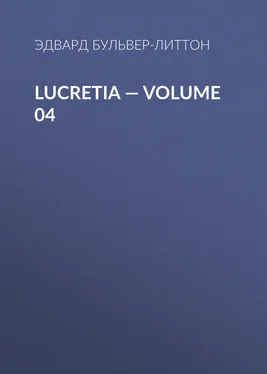Эдвард Бульвер-Литтон - Lucretia — Volume 04
Здесь есть возможность читать онлайн «Эдвард Бульвер-Литтон - Lucretia — Volume 04» — ознакомительный отрывок электронной книги совершенно бесплатно, а после прочтения отрывка купить полную версию. В некоторых случаях можно слушать аудио, скачать через торрент в формате fb2 и присутствует краткое содержание. Жанр: literature_19, foreign_detective, на английском языке. Описание произведения, (предисловие) а так же отзывы посетителей доступны на портале библиотеки ЛибКат.
- Название:Lucretia — Volume 04
- Автор:
- Жанр:
- Год:неизвестен
- ISBN:нет данных
- Рейтинг книги:4 / 5. Голосов: 1
-
Избранное:Добавить в избранное
- Отзывы:
-
Ваша оценка:
- 80
- 1
- 2
- 3
- 4
- 5
Lucretia — Volume 04: краткое содержание, описание и аннотация
Предлагаем к чтению аннотацию, описание, краткое содержание или предисловие (зависит от того, что написал сам автор книги «Lucretia — Volume 04»). Если вы не нашли необходимую информацию о книге — напишите в комментариях, мы постараемся отыскать её.
Lucretia — Volume 04 — читать онлайн ознакомительный отрывок
Ниже представлен текст книги, разбитый по страницам. Система сохранения места последней прочитанной страницы, позволяет с удобством читать онлайн бесплатно книгу «Lucretia — Volume 04», без необходимости каждый раз заново искать на чём Вы остановились. Поставьте закладку, и сможете в любой момент перейти на страницу, на которой закончили чтение.
Интервал:
Закладка:
In the mean while Beau had very leisurely approached the bilious-looking terrier; and after walking three times round him, with a stare and a small sniff of superb impertinence, halted with great composure, and lifting his hind leg— O Beau, Beau, Beau! your historian blushes for your breeding, and, like Sterne's recording angel, drops a tear upon the stain which washes it from the register—but not, alas, from the back of the bilious terrier! The space around was wide, Beau; you had all the world to choose: why select so specially for insult the single spot on which reposed the wornout and unoffending? O dainty Beau! O dainty world! Own the truth, both of ye. There is something irresistibly provocative of insult in the back of a shabby-looking dog! The poor terrier, used to affronts, raised its heavy eyelids, and shot the gleam of just indignation from its dark eyes. But it neither stirred nor growled, and Beau, extremely pleased with his achievement, wagged his tail in triumph and returned to his master,—perhaps, in parliamentary phrase, to "report proceedings and ask leave to sit again."
"I wonder," soliloquized Percival St. John, "what that poor fellow is thinking of? Perhaps he is poor; indeed, no doubt of it, now I look again. And I so rich! I should like to— Hem! let's see what he's made of."
Herewith Percival approached, and with all a boy's half-bashful, half- saucy frankness, said: "A fine prospect, sir." The pedestrian started, and threw a rapid glance over the brilliant figure that accosted him. Percival St. John was not to be abashed by stern looks; but that glance might have abashed many a more experienced man. The glance of a squire upon a corn-law missionary, of a Crockford dandy upon a Regent Street tiger, could not have been more disdainful.
"Tush!" said the pedestrian, rudely, and turned upon his heel.
Percival coloured, and—shall we own it?—was boy enough to double his fist. Little would he have been deterred by the brawn of those great arms and the girth of that Herculean chest, if he had been quite sure that it was a proper thing to resent pugilistically so discourteous a monosyllable. The "tush!" stuck greatly in his throat. But the man, now removed to the farther verge of the hill, looked so tranquil and so lost in thought that the short-lived anger died.
"And after all, if I were as poor as he looks, I dare say I should be just as proud," muttered Percival. "However, it's his own fault if he goes to London on foot, when I might at least have given him a lift. Come, Beau, sir."
With his face still a little flushed, and his hat unconsciously cocked fiercely on one side, Percival sauntered back to his britzska.
As in a whirl of dust the light carriage was borne by the four posters down the hill, the pedestrian turned for an instant from the view before to the cloud behind, and muttered: "Ay, a fine prospect for the rich,—a noble field for the poor!" The tone in which those words were said told volumes; there spoke the pride, the hope, the energy, the ambition which make youth laborious, manhood prosperous, age renowned.
The stranger then threw himself on the sward, and continued his silent and intent contemplation till the clouds grew red in the west. When, then, he rose, his eye was bright, his mien erect, and a smile, playing round his firm, full lips, stole the moody sternness from his hard face. Throwing his knapsack once more on his back, John Ardworth went resolutely on to the great vortex.
CHAPTER I
The 8th of September, 1831, was a holiday in London. William the Fourth received the crown of his ancestors in that mighty church in which the most impressive monitors to human pomp are the monuments of the dead. The dust of conquerors and statesmen, of the wise heads and the bold hands that had guarded the thrones of departed kings, slept around; and the great men of the Modern time were assembled in homage to the monarch to whom the prowess and the liberty of generations had bequeathed an empire in which the sun never sets. In the Abbey—thinking little of the past, caring little for the future—the immense audience gazed eagerly on the pageant that occurs but once in that division of history,—the lifetime of a king. The assemblage was brilliant and imposing. The galleries sparkled with the gems of women who still upheld the celebrity for form and feature which, from the remotest times, has been awarded to the great English race. Below, in their robes and coronets, were men who neither in the senate nor the field have shamed their fathers. Conspicuous amongst all for grandeur of mien and stature towered the brothers of the king; while, commanding yet more the universal gaze, were seen, here the eagle features of the old hero of Waterloo, and there the majestic brow of the haughty statesman who was leading the people (while the last of the Bourbons, whom Waterloo had restored to the Tuileries, had left the orb and purple to the kindred house so fatal to his name) through a stormy and perilous transition to a bloodless revolution and a new charter.
Tier upon tier, in the division set apart for them, the members of the Lower House moved and murmured above the pageant; and the coronation of the new sovereign was connected in their minds with the great measure which, still undecided, made at that time a link between the People and the King, and arrayed against both, if not, indeed, the real Aristocracy, at least the Chamber recognized by the Constitution as its representative. Without the space was one dense mass. Houses, from balcony to balcony, window to window, were filled as some immense theatre. Up, through the long thoroughfare to Whitehall, the eye saw that audience,—A PEOPLE; and the gaze was bounded at the spot where Charles the First had passed from the banquet-house to the scaffold.
The ceremony was over, the procession had swept slowly by, the last huzza had died away; and after staring a while upon Orator Hunt, who had clambered up the iron palisade near Westminster Hall, to exhibit his goodly person in his court attire, the serried crowds, hurrying from the shower which then unseasonably descended, broke into large masses or lengthening columns.
In that part of London which may be said to form a boundary between its old and its new world, by which, on the one hand, you pass to Westminster, or through that gorge of the Strand which leads along endless rows of shops that have grown up on the sites of the ancient halls of the Salisburys and the Exeters, the Buckinghams and Southamptons; to the heart of the City built around the primeval palace of the "Tower;" while, on the other hand, you pass into the new city of aristocracy and letters, of art and fashion, embracing the whilom chase of Marylebone, and the once sedge-grown waters of Pimlico,—by this ignoble boundary (the crossing from the Opera House, at the bottom of the Haymarket, to the commencement of Charing Cross) stood a person whose discontented countenance was in singular contrast with the general gayety and animation of the day. This person, O gentle reader, this sour, querulous, discontented person, was a king, too, in his own walk! None might dispute it. He feared no rebel; he was harassed by no reform; he ruled without ministers. Tools he had; but when worn out, he replaced them without a pension or a sigh. He lived by taxes, but they were voluntary; and his Civil List was supplied without demand for the redress of grievances. This person, nevertheless, not deposed, was suspended from his empire for the day. He was pushed aside; he was forgotten. He was not distinct from the crowd. Like Titus, he had lost a day,—his vocation was gone. This person was the Sweeper of the Crossing!
He was a character. He was young, in the fairest prime of youth; but it was the face of an old man on young shoulders. His hair was long, thin, and prematurely streaked with gray; his face was pale and deeply furrowed; his eyes were hollow, and their stare gleamed, cold and stolid, under his bent and shaggy brows. The figure was at once fragile and ungainly, and the narrow shoulders curved in a perpetual stoop. It was a person, once noticed, that you would easily remember, and associate with some undefined, painful impression. The manner was humble, but not meek; the voice was whining, but without pathos. There was a meagre, passionless dulness about the aspect, though at times it quickened into a kind of avid acuteness. No one knew by what human parentage this personage came into the world. He had been reared by the charity of a stranger, crept through childhood and misery and rags mysteriously; and suddenly succeeded an old defunct negro in the profitable crossing whereat he is now standing. All education was unknown to him, so was all love. In those festive haunts at St. Giles's where he who would see "life in London" may often discover the boy who has held his horse in the morning dancing merrily with his chosen damsel at night, our sweeper's character was austere as Charles the Twelfth's. And the poor creature had his good qualities. He was sensitively alive to kindness,—little enough had been shown him to make the luxury the more prized from its rarity! Though fond of money, he would part with it (we do not say cheerfully, but part with it still),—not to mere want, indeed (for he had been too pinched and starved himself, and had grown too obtuse to pinching and to starving for the sensitiveness that prompts to charity), but to any of his companions who had done him a good service, or who had even warmed his dull heart by a friendly smile. He was honest, too,— honest to the backbone. You might have trusted him with gold untold. Through the heavy clod which man's care had not moulded, nor books enlightened, nor the priest's solemn lore informed, still natural rays from the great parent source of Deity struggled, fitful and dim. He had no lawful name; none knew if sponsors had ever stood security for his sins at the sacred fount. But he had christened himself by the strange, unchristian like name of "Beck." There he was, then, seemingly without origin, parentage, or kindred tie,—a lonesome, squalid, bloodless thing, which the great monster, London, seemed to have spawned forth of its own self; one of its sickly, miserable, rickety offspring, whom it puts out at nurse to Penury, at school to Starvation, and, finally, and literally, gives them stones for bread, with the option of the gallows or the dunghill when the desperate offspring calls on the giant mother for return and home.
Читать дальшеИнтервал:
Закладка:
Похожие книги на «Lucretia — Volume 04»
Представляем Вашему вниманию похожие книги на «Lucretia — Volume 04» списком для выбора. Мы отобрали схожую по названию и смыслу литературу в надежде предоставить читателям больше вариантов отыскать новые, интересные, ещё непрочитанные произведения.
Обсуждение, отзывы о книге «Lucretia — Volume 04» и просто собственные мнения читателей. Оставьте ваши комментарии, напишите, что Вы думаете о произведении, его смысле или главных героях. Укажите что конкретно понравилось, а что нет, и почему Вы так считаете.












